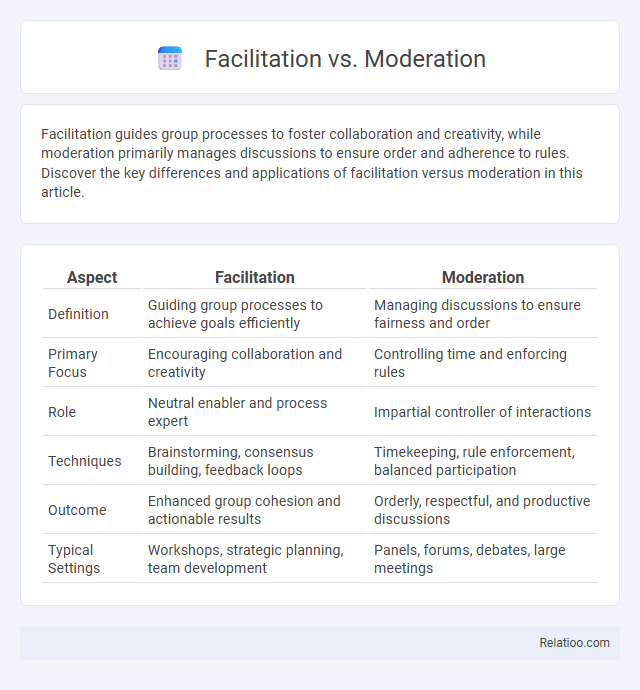Facilitation guides group processes to foster collaboration and creativity, while moderation primarily manages discussions to ensure order and adherence to rules. Discover the key differences and applications of facilitation versus moderation in this article.
Table of Comparison
| Aspect | Facilitation | Moderation |
|---|---|---|
| Definition | Guiding group processes to achieve goals efficiently | Managing discussions to ensure fairness and order |
| Primary Focus | Encouraging collaboration and creativity | Controlling time and enforcing rules |
| Role | Neutral enabler and process expert | Impartial controller of interactions |
| Techniques | Brainstorming, consensus building, feedback loops | Timekeeping, rule enforcement, balanced participation |
| Outcome | Enhanced group cohesion and actionable results | Orderly, respectful, and productive discussions |
| Typical Settings | Workshops, strategic planning, team development | Panels, forums, debates, large meetings |
Understanding Facilitation and Moderation
Facilitation involves guiding group discussions to enhance collaboration and ensure all voices are heard, focusing on process and group dynamics rather than content control. Moderation centers on enforcing rules and managing interactions to maintain order and respect, especially in forums or debates. Understanding facilitation requires recognizing its role in fostering creativity and consensus, while moderation emphasizes conflict resolution and maintaining structure.
Core Roles and Responsibilities
Facilitation centers on guiding group processes to ensure collaboration and consensus, focusing on managing dynamics and encouraging participation. Moderation involves steering discussions or debates, maintaining order, and ensuring all voices are heard without influencing the content. Your role in facilitation emphasizes creating a supportive environment for decision-making, while moderation prioritizes impartial control of communication flow.
Key Skills Required
Facilitation requires strong communication, active listening, and conflict resolution skills to guide groups toward consensus and collaboration. Moderation demands impartiality, quick decision-making, and the ability to manage discussions and enforce rules effectively. Facilitation, focusing on enabling conversations, relies heavily on empathy, adaptability, and group dynamics understanding to foster productive interaction without dominating.
Typical Contexts and Applications
Facilitation typically occurs in collaborative settings such as workshops, team meetings, or strategic planning sessions where guiding group process and fostering participation are key. Moderation is commonly applied in discussions, panels, or debate formats where managing turn-taking, maintaining order, and ensuring balanced input are essential. Facilitation, often used interchangeably but sometimes distinguished by a focus on supporting consensus and decision-making, suits conflict resolution or change management scenarios where your role is to help navigate complex group dynamics.
Communication Styles Compared
Facilitation emphasizes guiding group discussions with open-ended questions to encourage collaboration, while moderation focuses on managing the flow and ensuring that everyone adheres to rules and time limits. Facilitation promotes a collaborative communication style that nurtures sharing and creativity, whereas moderation employs a directive style to keep conversations on track and resolve conflicts efficiently. Your understanding of these distinctions helps tailor communication approaches to meet the specific needs of meetings and group dynamics.
Decision-Making Approaches
Facilitation in decision-making involves guiding groups toward consensus by encouraging open dialogue and ensuring equal participation, often using structured techniques to explore options. Moderation centers on managing discussions to maintain order and keep the conversation on track, focusing less on the content and more on process control. Facilitation blends elements of both but emphasizes empowering participants to co-create solutions, making it particularly effective for collaborative decision-making contexts.
Handling Group Dynamics
Handling group dynamics requires distinct approaches in facilitation, moderation, and mediation, each focusing on different interaction aspects. Facilitation encourages active participation and collaboration, guiding your team towards collective goals by managing diverse perspectives. Moderation ensures balanced communication and respectful discourse, while mediation addresses conflicts by resolving disputes and fostering mutual understanding.
Tools and Techniques Used
Facilitation employs tools like brainstorming, mind mapping, and consensus-building techniques to guide group decision-making and idea generation, focusing on creating a collaborative environment. Moderation uses structured agendas, timekeeping tools, and conflict resolution methods to manage discussions, ensuring balanced participation and adherence to rules. Your choice between facilitation and moderation should align with the need for either fostering creativity and collaboration or maintaining order and focus during conversations.
Advantages and Limitations
Facilitation enhances group decision-making by encouraging collaboration and active participation, yet it may struggle with managing dominant personalities. Moderation maintains order and enforces rules during discussions, providing clear structure but potentially limiting creative dialogue. Facilitation blends both approaches to balance engagement and control, although it requires skilled facilitators to navigate complex group dynamics effectively.
Choosing the Right Approach for Your Needs
Choosing the right approach for your needs depends on understanding the distinct roles of facilitation, moderation, and coaching. Facilitation guides group processes to achieve collaborative outcomes, while moderation manages discussions by maintaining order and ensuring equal participation. Coaching offers personalized support to enhance individual performance and development, enabling you to select the method that aligns with your specific goals and context.

Infographic: Facilitation vs Moderation
 relatioo.com
relatioo.com